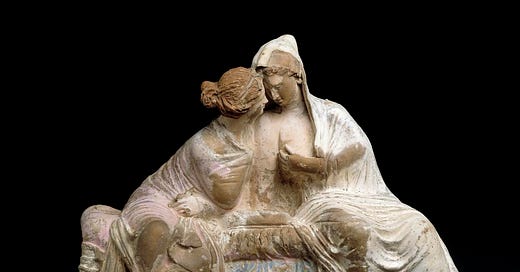Demeter and Persephone, British Museum
In her book, Matricentric Feminism, Andrea O’Reilly posits that motherhood is the unfinished business of feminism. I couldn’t agree with her more. Second-wave feminism has largely side-stepped the issue of motherhood, focusing instead on how women can do everything men can, achieving equality in the workplace, and generally conforming to patriarchal models of life and work. Eighty percent of women will choose to be mothers in their lifetime, and feminism that excludes discussion of motherhood alienates these women. Whether we like it or not, for those of us who become mothers, the experience is transformative and defining in our lives as women. Furthermore, to empower women in the workforce without empowering them in the domestic sphere as wives and mothers is downright exploitative. The data show that women who work full-time, and even those who earn more than their husbands, still do the majority of the childcare and domestic work. Somehow, the “we can do anything men can” slogan got twisted into “we should do everything men do…and still do all the childcare, laundry and cooking too.”
To quote O’Reilly, “Neo-traditional families appear to be new and even progressive because many contemporary, privileged heterosexual families have both an educated and professional mother and father. This family configuration continues to be problematic, however, since the basic foundation of second-wave family roles and responsibilities still hold once children arrive: mothers continue to be primary caregivers of children in this ‘new’ family type.This new norm creates complexity and tension for women because it demands that women simultaneously meet the intensive norms of the new ‘momism,’ while also meeting the intensive and exacting norms and expectations of professional careers.”
This is not to say that we should regress back to the 1950s when women were largely excluded from the professional and public sphere. Women are capable of mothering and working simultaneously (and indeed, if you look at our evolutionary history as a species, we always have), just not in strict conformity of patriarchal norms around professional participation, and certainly not without more help in the domestic sphere.
So what gives?
A lot of it has to do with how we redefine work expectations and fund support systems for new mothers. Much of this hinges on vision and advocacy. It’s deeply political. While I believe that we cannot achieve a truly empowered version of motherhood without this kind of broad societal change, I am also eager to explore how we can practice empowered motherhood at home, in the absence of these broader shifts. That’s what I’ll focus on here.
O’Reilly outlines seven themes for empowered mothering (based on a study by Erica Howritz. They are:
The importance of mothers meeting their own needs
Being a mother does not fulfill all of a woman’s needs
Involving others in their child’s upbringing
Actively questioning the expectations placed on mothers by society
Challenging mainstream parenting practices
Not believing that mothers are solely responsible for how their children turn out
Challenging the idea that the only emotion mothers ever feel towards their children is love
Over the course of the next few weeks I will be exploring each of these seven themes in depth via this newsletter and on my instagram. I would love it if you would share your own stories and ideas about what it means to be an “empowered” mother in the comments! As always, please share/forward this with anyone you feel would benefit from these discussions and this community. Thanks for being here!





Busy-tizzy twinmama here almost didn’t open because #whohastime to do what we’re really drawn to— glad I did and thanks as usual for so intelligently, thoughtfully, and heartfully bringing into structured language these sort of “tenets for full humanity of women” I’ve long felt but never heard spoken clearly, especially with the mother in mind. Mothers are treated as madonnas rather than real, complex, nuanced people. The only way is down from that kind of construct, and I’m super relieved to have a place to go both on substack and Instagram to feel the validation, celebration, exploration, elaboration, and fine-tuning of the mad orca song.
Thanks for this. I did I deep dive and requested this book from the university library. Looking forward to it!